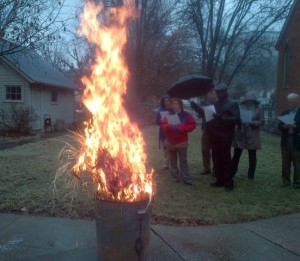It probably sounds odd or even redundant to say that St. Anthony parish values liturgy. After all, worship is the source and summit of the Catholic Church. Don’t all Catholic churches value liturgy? What makes St. Anthony any different (and make no mistake, we think we are not a typical church in our attitude and practices regarding Sunday worship)?
When I first came here, two and a half years ago, it was a revelation to participate at liturgy in which full, active, conscious participation is the norm. People here sing, they respond to the prayers, they are remarkably friendly. If you come here on the day when liturgical ministers are commissioned, you will see a good third to half of the congregation commit to serving in one or more of the roles open to the laity.
All of this, though, is the manifestation of an underlying charism that sets this parish apart from many. The parishioners of St. Anthony profoundly experience liturgy as communion, as an experience of Christ through the four manifestations elucidated in the Constitution on the Sacred Liturgy: the Word, the eucharistic elements, the presider and the people. Most churches get the first three of these, but truly embracing the Real Presence in the assembly is not so easily discerned—or at least not so obviously perceived in many churches.
Seeing the congregation as Real Presence means seeking excellence in every aspect of the worship experience. It means taking responsibility for the liturgy so that the priest isn’t held solely responsible for the encounter with Christ. It causes worshipers to regard each other as important, which leads to an attitude of caring and concern, of appreciation of the gifts each person brings. Experiencing Christ in the assembly creates an electric atmosphere.
In some ways this parish might seem (borrowing a descriptor of the worship experience of the ‘70’s) “happy-clappy” because of the exuberance of the worship experience. This is far too dismissive of the depth of this church. Care for details here is intense. Expectations are high. There is an admirable degree of professionalism among our lay ministers. Joy does not imply laxity. Jesus’ followers were considered a merry band. Why shouldn’t we be too if we are encountering Christ? The joy doesn’t come from a lackadaisical attitude toward worship. It comes from experiencing worship done well. It comes from experiencing Christ.
